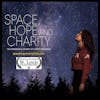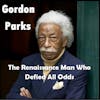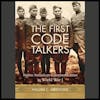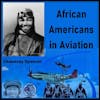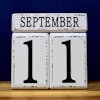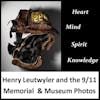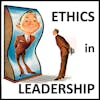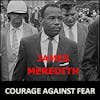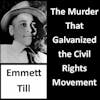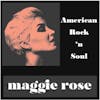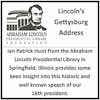Cross-Cultural Tunes: From Indian Ragas to Jazz Riffs
This episode of Saint Louis In Tune features an insightful discussion on the fusion of various music genres, including jazz, classical, rap, R&B, Indian music, and more. Seema Kasthuri, a practitioner, performer, and teacher of Carnatic Classical music from St. Louis, Missouri discusses the upcoming event, 'Harmony in Music', set to showcase the collaborative blending of Carnatic classical music with Western jazz improvisation, featuring a diverse lineup of musicians. The dialogue explores the interconnectedness of music, community, and culture.
Saint Louis In Tune welcomes Seema Kasturi, a practitioner of Carnatic Classical music from St. Louis. Seema shares insights on her upcoming show, Harmony in Music, which aims to blend Carnatic classical music with Western improvisation, including jazz and other genres, alongside English literature for broader comprehension. The segment underlines the collaborative essence of music across cultures and highlights the event scheduled for April 6th at the Grandel Theatre. Besides musical endeavors, the episode also touches on an St. Louis Cardinals' history, Yogi Berra's famous quotes, and various recognitions of national and international observances.
[00:00] Fusion of Musical Genres: A Unique Blend
[00:27] Welcome to St. Louis In Tune: A Fresh Perspective
[01:04] Civility and Parking Etiquette: A Light-hearted Banter
[02:19] Introducing Seema Kasturi: A Maestro of Carnatic Classical Music
[02:53] Harmony in Music: A Fusion Concert Preview
[03:14] The Art of Improvisation: Blending Carnatic and Jazz
[09:12] Exploring Carnatic Music: Scales, Improvisation, and Rehearsals
[14:17] A Multifaceted Talent: From Music to Software Engineering
[17:46] Engaging with the Audience: The Power of Interactive Performances
[20:23] Bridging Cultures Through Music: Seema Kasturi's Vision
[23:05] The Dred Scott Heritage Foundation: A Call for Commemoration
[24:07] St. Louis In Tune: A Platform for Informative Stories
[25:42] Harmony and Music: A Final Reminder
[31:35] Nostalgic Baseball Memories and Stadium Experiences
[32:38] Stadium Amenities and Changes Over Time
[34:36] Historical Highlights and Cardinal Achievements
[36:34] Unique Stadium Events and Fan Experiences
[38:24] Concerts and Other Events at the Stadium
[41:17] National Days and Fun Facts
[47:06] Yogi Berra's Wisdom and Legacy
- Harmony in Music – Soorya Performing Arts
- Seema Kasthuri YouTube
- Seema Kasthuri – Soulful Music
- Soorya Performing Arts
This is Season 7! For more episodes, go to stlintune.com
#grandeltheatre #sooryaperformingarts #harmonyinmusic #carnaticclassicalmusic #carnaticmusic #seemakasthuri #toddmosby #fusioninmusic #musicalstyles
Thank you for listening. Please take time to rate us on Apple podcasts,
Podchaser, or your favorite podcast platform.
Arnold:
When you talk about fusion, many of you will think about jazz, but how about if you're fusi Classical, rap, R& B, and some Indian music together. What are you going to get? You'll find out here on St. Louis In Tune. Welcome to St. Louis In Tune. And thank you for joining us for fresh perspectives on issues and events with experts, community leaders, and everyday people who are driving change and making an impact that shapes our society and world. I'm Arnold Stricker with Mark Langston. Mark. Greetings to you, sir.
Mark:
As they say at the Mason Dixon line, howdy. Is that what they say? I don't know. Howdy. Howdy. Duty. Howdy duty. Oh, now you're dating yourself. I'm dating myself. Yes,
Arnold:
I am. You are dating yourself. I shouldn't do that. People will think I'm really old.
Mark:
It's good to see you. Good to see you, too. Even at your age. It's good to be seeing you.
Arnold:
Yes, it
Mark:
is.
Arnold:
Our return to civility today, folks. I did this one today. Park in a spot that's far from the entrance to where you're going. Oh. Part of the reason I did that was because of the only spot available.
Mark:
So you were forced to do it. I was forced to do that. Okay. But you'll get more, you'll get
Arnold:
more exercise and it will save the closer spots for people who need them. Ah, there you go. Let's, hold on, we need to get out of here. Plus, if you get a new vehicle, it's like you park way away from everybody Oh, yeah, like really far away, but there's always somebody that will park right next to you take up two spots It's like what in the world? I know, you've got the whole parking lot You park next to me like comfort and
Mark:
really close. Yeah, and you know when they open the door, they're gonna ding Yeah, they're a ding,
Arnold:
yes,
Mark:
it's like there's no way And I'm really careful about that, just on the record, and I know there's not people that are. They just, eh, I don't care. Sling that door open. Oh yeah, get that thing open. I need all the room I can get. I'm thinking that's why your car looks like it is the way it is. Wow,
Arnold:
I know. So be considerate and park in a spot that's far from the entrance to where you're going because you will get more exercise and it will save the closer spots for people who need them. Oh my goodness. Yes. Good idea. That's good. That's good. I like that. We're not parking away from what we're talking about today because we have Seema Kasturi in studio. She's a practitioner, performer, and teacher of Carnatic Classical from St. Louis, Missouri. She has performed and traveled extensively in the United States performing concerts and participating in mega events like, I'm not going to be able to pronounce this.
Seema:
Oh gosh. Okay. All right. Sagaradache. That basically means across the ocean. Okay.
Arnold:
Sagaradache. Yes. Okay. She's performed with that. Welcome to St. Louis in Tune. Wow.
Seema:
Thank you so much. She's
Arnold:
here to talk to us about harmony in music. And this is April 6th at the Grandel Theater, 6. 30 p. m. The Surya Performing Arts are putting this on. And if you want tickets, you can go to MetroTix. And this piece, Particular harmony in music. Describe what that's going to be, Seema.
Seema:
Harmony in music. So harmony, the reason we chose this, at least what comes to me is harmonies when, multitude of musicians that are here, when we come across, come together, the the harmony and the the working together of how the working relationship, how that goes. Because we all come from, especially I have the Indian classical music background. So when we bring everyone together, how do we communicate? How do we? resolve all everything that's within music and a little bit outside. So that's why this harmony in music is that's the word. But what we're going to be showcasing with this is the Carnatic classical aspects of music, which is what I studied for many years. And it has a lot of, it has room for improvisation. So we are going to experiment this with the Western jazz side of the house in terms of improvisation.
Arnold:
Okay.
Seema:
And we're going to use some of our melodies or ragas, which we call in Indian music and hopefully get everyone to collaborate and improvise and also bring in some English literature, like English words, be it the subject of love or peace or harmony, whatever that might be. So audience can better understand. We are also doing some Beatles stuff.
Arnold:
So the instrumentation is going to be what?
Seema:
Instrumentation is so I'm the vocal. And we have lead guitars, which is Todd Mosby, who's also a practitioner of Hindustani music, Indian classical music, for many years. So he's our guitar lead on that. We also have a bass, Ben Cohen, who's doing bass. And then we have keys, piano Matt Galeck on that. And we have flute, western flute, and we have an excellent drummer Steve Davis. And we have our Indian drummer, which is called the Mridangam, Prasanna Kasturi is going to play that. And we have Indian violinist, and his name is Balaji. He's coming from Kansas City. He's riding all the way from Kansas. So that's the core band.
Arnold:
Are you having a couple other vocalists I've seen that you've had?
Seema:
Yes, I have my students. Will be helping support vocalize. Okay. Yes. Yeah.
Arnold:
Mark watching this I saw a little couple of clips of this on the website and it gives a really nice, interesting flavor because when you're watching a jazz performance, somebody will play a little riff or something and maybe the drummer will pick up the little, motif there. They'll go back and forth, and it's very similar, but we've got a little clip of this, so we can maybe do, so just to get people an understanding of what they could be listening to here. And you hear western instruments, but you also hear, Indian melodies, you hear Indian harmonies, and, your vocals there, and Todd's gonna pick up one. Guitar, a guitar solo here in a little bit, and then obviously the violin's playing, and there's a drum solo. That's right. It's really a very interactive kind of fusion of really a whole international flavor going on there. Now, are the songs that you're going to be performing, are any of those on your new album, Wind Chime? Yes.
Seema:
Yes. So the Asatoma which is basically it's, this one is a peace mantra from Indian verse, Sanskrit verse. So that's why I called it it's like a peace bridge, right? I thought it's so relevant to even modern world. So that's why when I wrote my lyrics, I said, take me from fable to truth. I want to see the truth. Take from, take me from darkness to light. So like a world global peace. That's what the Shloka, the verse says as a Doma from False from what is false to what is true, which is the ultimate truth so yeah This is on wind chime. And then We are doing gonna be doing what else maybe out of the tune from wind chime Now, do
Arnold:
you compose these yourself? Are these your compositions?
Seema:
This asatoma is my composition and then we had This is actually on YouTube as well. We this is when I recorded with someone in India one of the You Composers. Okay. So I compose and then he helps me out. Okay. Music.
Arnold:
Is this that same first song or?
Seema:
Interesting. So this is the one we created specifically for Harmony in Music when we did last time. So because it was, I said breaking boundaries and that was, Prasanna came up with that. And so the words to this is, you're breaking boundaries by being together.
Arnold:
Okay. Do you give the audience a translation of the it's in Hindi, right?
Seema:
This this is completely in English,
Arnold:
okay.
Seema:
And what I'm, when you hear those notes, those are just notes like do, re, mi, fa, oh, okay. Sofesh. Yeah. Exa, Sofesh. Exactly. So that's all I'm using in terms of what is non non English or Indian.
Arnold:
Okay.
Seema:
Everything else in this song at least is in English. And then we are using all these improv. So Chad is going to be improvving, improvising in his sense of how the Tunes should align. And I'm just using those solfege, the notes.
Arnold:
Okay.
Seema:
So the notes, each, every melody has a distinct placement. So that's what makes, that's what is called a raga in the Carnatic music, when it has a certain scientific, mathematical, emotional, everything coming together.
Mark:
Okay. I love the improv ing. Yeah. I think that's fantastic. It really is. Very jazz like. Yeah. Jazz
Seema:
like. That's good. That's good. Because that is what, that was the key takeaway for us. It's feeling of jazz to us is that improvisation, which happens a lot in Carnatic music which I practice.
Arnold:
Yeah. Talk a little bit more about Carnatic music. I had to look that up. I'm not familiar with that. It's really the classical Indian music.
Seema:
Yes. This is the classical Indian music. We have basically 72 parent scales. So these are all different frequencies of notes. Maybe I can just give an example, I was thinking. So the major scale that you call, so that is what we call Shankarabharana.
Arnold:
Okay.
Seema:
So this is, we actually sing it in different shrutis or keys. It doesn't have to be in A. Oh, I'm sorry, it doesn't have to be in C. So this can come across in any range of pitch you're comfortable with. As a female singer, I always sing in G.
Arnold:
Okay.
Seema:
So to me, I can sing G in various melodies. It doesn't have to be, this particular scale. So that is one thing that's a little different to the western. To going back to the same tune. So the Shankara Barana or the major scale, Um, Uh, Uh, Uh, Uh, Uh. Ah, naa, naa, naa, naa, naa, naa, naa, naa, naa, naa, naa, naa, naa, naa. Let's be Sree, Ga Maa, Pada, Nee, Saa! That's one of the scales. Okay. So basically if you put it in C, this is major scale.
Arnold:
Yeah!
Seema:
When I sing the same thing in C. So we have 72 such major scales in Carnatic music. Wow. And the notes that are put in are all seven notes. But they have it's the placement, There's another tune, Kalyani, which is I think Lydian, if I'm not mistaken, in western. So it goes Lydian mode? Lydian mode, exactly. Okay. Sare ga maa pada nisaa That's the treatment that is given in Carnatic music, all the extra, Like little nuances? Nuances and knowing where to stress, what note to stress. And that's actually core Carnatic music. Okay. But with this, we've just tried to come in between. Find a center sweet spot. Yeah.
Arnold:
How often do you guys rehearse?
Seema:
The good thing about this is we put up our first show in 2022. So the most of the band came together. So they're all familiar with what we're doing. So now we had to do about maybe five, six sittings together. Okay. And they're all,
Arnold:
It's like typical good musicians. You get to, you got your basics down. Okay, now let's play the game. Now let's play.
Seema:
Hopefully, it'll get to an to a state wherein, you don't have to even rehearse and you just come in together and have some fun. Yeah. There is a certain breaking that barrier, experimenting out of your comfort zone. There's a lot to
Mark:
say about just having fun. Oh. Really. If you're not having fun. If you get to the point where you're having fun, I think that you've arrived. It's work. It's a threshold. Otherwise it's work. It is, but otherwise But having fun is what, yeah, makes a difference, I think, in the outcome. Well said. I love that. Okay, we can talk about fun
Arnold:
all day, but go ahead, Arnold. So this is April 6th at the Grandale Theater, and you can get tickets, votes, at MetroTix or soryaperformingarts. org, S O R Y A performingarts. org, and you've been singing all your life?
Seema:
Pretty much. I started singing when I was five, and my mom tells me I was I would listen to all these songs on the radio and just copy them. That's when she thought, maybe this girl has something. And so she just enrolled me in formal training.
Arnold:
Okay. This is Arnold Strick with Mark Langston of St. Lucien Tune. We're talking to Seema Kasturi about harmony in music. Matter of fact, her mom recognized her talent. And this is a cover of Megan Trainer and John Legend's song. You're a really trained musician. A lot of musicians, they'll do one thing. You're very fluid with being able to sing, Megan Trainor songs, or do covers, or, do what you're doing in the in Soria at the Harmony of Music. You mentioned that this was previously done. Is this going to be an annual thing? Are you going to put on more concerts during the year rather than just one?
Seema:
Yeah, my, our aim mainly is to, try and perform at various festivals, that's the aim, eventually. Over the year, throughout the year, if we can reach out to other venues and expose this to more people, as opposed to just Surya. That's the aim. That's the goal. Hopefully we can take it across the country and perform at some festivals jazz festivals other festivals That's the aim for it. But for now You know, it's a once a year thing or you know Every couple years,
Arnold:
I read somewhere else that you're a dancer. Also, you're a well, let me here we go singer lyricist composer Dancer, and, get this one Mark, software engineer. Wait. That doesn't seem to fit in that grouping there. Actually, it does fit in that grouping there. Yeah, really? Because mathematically, there is a lot which you say. I'm a musician too, so I understand. Software engineer, you have to deal with math, you have to deal with kind of how kind of some systems are set up. And music is a system. Yeah. So tell us about the software engineer. How'd that kinda get any in there?
Seema:
Ooh I'm not a great mathematician. I, I never liked math, Me neither. I'm with you, with neither. I'm with you on that one. I always loved writing stories and more of the language when I was growing up. Not so good with math, but. Software engineering. I don't know. I don't know that it ever fit except now it's the A. I world. So I know software played a role there and I can certainly use the A. I for to hone my lyrics or whatnot. But outside of that, not so much. You don't
Arnold:
work for some private company that's developing software, do you?
Seema:
I just work for AT& T. It's a telecom company.
Arnold:
Just some minor company there. They're just coming on the scene. So you work on honing All of those little alerts that we get and stuff like that, or the apps and how things maneuver with AT& T.
Seema:
With AT& T if you have a service, then I work on the app that tells the customer that, hey, your service is going to be installed at a certain time. Okay. Hopefully it's all good experience for you. So it's, so we tell you when you're, we are going to come install that service and what time the tech is going to arrive.
Arnold:
Okay. We're
Seema:
trying to make it good for our customers.
Arnold:
You're trying to get rid of all the clinks and stop offs and make things a little smoother. Smoother,
Seema:
exactly. Do you,
Arnold:
talking about this a little bit because I'm down this road right now, do you find that companies that utilize software to make that connection smoother have better customer service or do people want to talk to somebody face to face? What, in your experience? Yes.
Seema:
Both, I think, because these days, that's what the companies are trying, right? They want to seamlessly figure out where a problem is. And even before the customer knows about it, they want to resolve the problem. So I think that's important, too. But there are some customers that love the face to face talk, or I guess voice to voice talk. So I think both are important. Okay. Yeah. But with the modern, when people have less and less time. They want to obviously look at the apps and know what's going on.
Arnold:
So how has that perspective guided, or has it guided anything in what you're doing with Harmony in Music?
Seema:
Actually, I'm going to say this career in IT, or for that matter, any big company, in this case AT& T it has helped me a long way to build my communication skills and think You get a lot when you work with people in a corporate world. You talk to people and you know how that Definitely helps communicating with your fellow musicians too. All of that is I think is communication which definitely my job has taught me so That's very important
Arnold:
and I would call the grandelle is more of an intimate theater setting than something like Powell Hall or, The Fox. It's, you're, the audience is there.
Seema:
Closer, right? Okay.
Arnold:
Do you do a lot of interactions with them or talking to them in between sets or things like that?
Seema:
When we did the our first harmony music with this big of a scale group of musicians last in 2022 I was talking about it was in the Kirkwood Performing Arts Center They're little theater not the big theater
Arnold:
like the black box one black
Seema:
box exactly and that was like Exactly what you described was such a close setting and I could almost look at the audience and they were even asking me questions like Can you talk about how you and Todd met and what was your experience? Oh, yeah So that was a really neat and then we had you know audience pick up on some dance moves and stuff and we encourage them to dance but
Arnold:
You brought them up on stage and said, Hey, this is how you do this. I
Seema:
tried to get them and some of them were dancing in their chairs. They got up and they started to dance. That's
Arnold:
good.
Seema:
Yeah. But I think more audience when they are able to participate, that definitely brings them closer. Absolutely. Absolutely.
Arnold:
Oh yeah. So Todd's been on the show before. How did you and Todd meet?
Seema:
Todd So the teacher I took lessons with here, Ustad Imran Khan, he's a well known musician of sitar the Indian instrument sitar. So Todd took lessons from him much more than I did. So he was a student of Ustad Imran Khan. And then my husband Prasanna and I would go to Ustadji and I think my husband met Todd first. So they had a connection. So that's how we got introduced.
Arnold:
Okay.
Seema:
But not Very late after we met, I think Gausaji or Imran Khan passed away recently, but it's after that we started collaborating. And Todd has even played for my husband husband's music production, dance productions. So I accompanied him.
Arnold:
And Mark, what's, I think, is very valuable. What what Seema's talking about is the quality of the musicianship that, and the quality of the musicians that are going to be in this performance. A lot of people just they ride a lane okay I'm classical, or, okay, I'm just jazz. These folks, they play it all. They have the skill set and the desire to really be in a very kind of, yeah, in a very versatile setting. This is, it's a really quality performance just by listening to what we've listened to. Matter of fact, we can go out with number one there. And it's, I really encourage people to expand their horizons. And this is going to be at the Grandell Theater, April 6th at 6. 30 p. m. The Sora Performing Arts is going to be performing Harmony in Music. And you can get tickets at Metro Tickets, Metro Tix. Sima, do you have any last encouraging words for folks?
Seema:
So yeah, we would love for all our St. Louis based audience to come out and watch this only because this is a global music and we are trying to bridge. There is only one barrier to me. I think the language, right? It's a different language that we speak. And we are trying to say, Compose our songs and in English for the same purpose so we can reach out to audience and be one with with everyone out here. We do a lot of work. Surya Performing Arts actually does a lot of programs. We've been here, 20 years. And then so we do traditional dance, dances as well. It's a dance. We have a dance, a school, music school. It's a not for profit organization. We do a lot of work in Missouri. I request the audience to follow us and engage with this beautiful Indian art. We are on Surya Performing Arts and also Seema Kasturi. YouTube channel. So reach out and try to find the common ground. You will enjoy this music. There's, yeah, there is spirituality to it as well, which is what most of us are after. So we are trying to bridge that, try to help bring audience and tell them what we are doing. And like I said, the subject that I love a lot writing about is love, nature, peace. So I'm trying to. I'm going to be focused on these subjects and try to, as much as possible, write in English so the audience can come out and enjoy and not feel like it's another different world. So please come out and enjoy and try to learn about Indian music and how it blends with the Western world.
Arnold:
You can't go wrong with love, nature, and peace. No. There's something wrong with you if you can't. Now we'll post those websites on the podcast show notes, so look for those folks, and we'll make sure that you get all the information. So April 6th at the Grandale, 630 p. m. Metro Tix Harmony and Music. Seema, thanks for coming on St. Louis In Tune.
Seema:
Thank you so much for having
Music:
me. Take you for granted, cause you'll never know when they're running out of room.
Arnold:
This is Arnold Stricker of St. Louis In Tune on behalf of the Dred Scott Heritage Foundation. In 1857, the Dred Scott decision was a major legal event and catalyst that contributed to the Civil War. The decision declared that Dred Scott could not be free because he was not a citizen. The 14th Amendment was passed. Also called the Dred Scott Amendment, granted citizenship to all born or naturalized here in our country and was intended to overturn the U. S. Supreme Court decision on July 9, 1868. The Dred Scott Heritage Foundation is requesting a commemorative stamp to be issued from the U. S. Postal Service to recognize and remember the heritage of this amendment by issuing a stamp with the likeness of the man, Dred Scott. But we need your support and the support of thousands of people who would like to see this happen. To achieve this goal, we ask you to download, sign, And share the one page petition with others. To find the petition, please go to dreadscotlives. org and click on the Dreadscot petition drive on the right side of the page. On behalf of the Dreadscot Heritage Foundation, this has been Arnold Stricker of St. Louis In Tune.
Mark:
At St. Louis In Tune, we strive to bring you informative, useful, and reflective stories. As well as interviews about current and historic issues, and events that involve people, places, and things. We cover a wide range of topics, such as the arts, crime, education, employment, faith, finance, food, health, history, housing, humor, justice, and sports, and that's just to name a few. While St. Louis in Tune originates from the Gateway City and covers local topics, we also connect to what's going on nationally as well. If you missed any of our previously aired programs of St. Louis in tune, simply visit STL in tune. com. That's STL in tune. com. There you'll find the show notes and everything that was mentioned in that episode and all the other great episodes as well. And if you've got an area that you'd like us to examine deeper, we'll just let us know by dropping us a note at STL in tune at gmail. com. That's S STL intune@gmail.com. St. Louis Intune. It's heard Monday through Friday on the US radio network.com and many great radio stations around the US and of course, right here in St. Louis. Our website again is stlintune. com. Visit us today. That's stlintune. com.
Arnold:
Welcome back to St. Louis. In tune. This is Arnold Stricker with Mark Langston. I wanna encourage folks Harmony and Music. April 6th at the Grand Dale Theater, 6:30 PM Metro Ticks is where you can get tickets. It's the As Soya Performing Arts, and you can get more information also at as soya performing arts.org. That's S-O-O-R-Y-A performing arts.org. There's also a 15th American NAIA Festival. It's an Indian classical dance festival. That will be April 26th, 27th, and 28th at Clayton High School, so you might want to check that out. That's natya. org, n a t y a dot org. Very interesting, Mark.
Mark:
Oh, yeah.
Arnold:
Indian ragas with jazz. I never would have thought. I
Mark:
would have never thought. Yeah, it's an interesting kind of mix. And shame on me for not there's so much out there
Arnold:
in international music that I think is, we're really now getting exposed to, which is hard to believe, but, I think people are breaking down, as she was saying, people are breaking down barriers to be able to, one, number one, listen to it, number two interpret what's going on and three, appreciate what's going on.
Mark:
And I appreciate her trying to put English to it. Sometimes when it's in a different language, I get lost and I don't appreciate it. I don't understand what they're saying. I just got to go with the beat then. When she puts the English to it it makes a big difference.
Arnold:
Very much what Opera Theater St. Louis does is they take operas, they translate it into English and put the English up there. So you can. Which is helpful.
Mark:
Oh, yeah. I think it's the
Arnold:
best, not, not everybody speaks Italian, so let's or German and let's get it, let's get it where it needs to be. No. Yeah. I know we're from the United States and we don't learn things in a manner. We want
Mark:
people to, accommodate us. I know I, you're right. As she was talking, I was like, wow I don't think I could ever learn her language. I have enough trouble with even trying to learn Spanish, but her language seems even more complicated.
Arnold:
And languages are a very interesting thing about, the portion of the brain when you are young and you mold those particular sounds and You are, hearing other people speak different languages, especially those that are more guttural or really in the mouth kind of
Mark:
things very tough. It is tough. I know. Yeah. But again, I appreciate that she's making the effort to make, put the English do it. Yes. I think that's really, and that one song, the last one she did I can play just a portion of it. Just beautiful. Yes. Yes. She really has a great voice. She has a great voice. And she's producing it very well.
Arnold:
Yeah, and writing songs. There's a lot of independent we've had a lot of independent singers here on who write their own music and things like that. She's right up there with that. She has her website. It's Sema Kasturi. It's S E M A. K A S T H U R I dot com and I'll put that all in the show notes so folks you can just go right to that and also her YouTube channel.
Mark:
And some great musicians with her. Oh yes. And again to do the jazz kind of thing with this kind of music is just great. Yeah and watching it on
Arnold:
the YouTube was fun because you know they look at each other and okay you take it now and which is very Typical of, if you just watched a jazz combo play or something like that.
Mark:
And I love the Indian, they have an Indian drummer. Yes. So that's a whole different, it's a different kind of drum than our drums that we have here in America. It's a whole different style, different attitude. And it really adds a different kind of auditory flavor. Ooh, there you go. Wow. That's how you got your PhD, that kind of thing. Oh my goodness. Yes.
Arnold:
It's coming up on opening day. Oh, baseball. Oh yeah. Opening day is coming up and you know I was looking for, I know we've done this in the past, we've done some of the yogisms and we've even done some of the shenanisms, but I know, Bush Stadium, it's Bush Stadium 3 as it's known, because it, Sportsman Park at Grandin Dodier got named Bush Stadium and then there was the Bush stadium downtown, Bush Memorial Stadium downtown. And now we have the Bush Stadium 3. And it just got some trivia facts about it. Really? Yes.
Mark:
Oh, I'd
Arnold:
love that. Seating capacity of 44, 383. I think that's smaller than the other Bush. Yes. Yes. 3, 706 club seats and 61 luxury suites. And let's see here.
Mark:
Have you ever sat in the green seats? I, is that one of those seats you just talked about?
Arnold:
One, once. It's where you sit there and you can order, or you can go out and they've got this big smorgasbord, underneath the stadium there. You can get whatever food
Mark:
you want. I know it. Costs you nothing. I had a friend who sat in those seats and they were, he was about third or fourth row behind me. And he said he couldn't, he had to answer, he kept answering his phone. People were watching the game and they saw him on it. They kept calling him. Hey, I see you on TV. I see you on TV. Yeah.
Arnold:
It's especially those people that sit right behind home plate and they're
Mark:
always there. Yeah. Can I tell you an old kid's story? Oh yeah. Mr. McShane was in our our parish where we, where I grew up and he was the business manager of the Cardinals. So when I was a kid, a very young kid. Lad we used to get on the Redbird Express bus. Oh, yeah. Yeah and take it to the ballpark and we go to the business office and We would knock on the door and ask for mr. McShane and say can we use your tickets? Mr. McShane And his tickets were the third row behind home plate. Oh my gosh. And so I grew up begging for those tickets for Mr. McShane, but we would all, the kids in the neighborhood, we would get, and he'd never failed once in a while. He'd have some VIP or something, but we usually went during the day. We never took the, we never went down at night. So it was always the day games, but Mr. McShane, if you're anywhere thank you for, Helping a young lad enjoy the sport of baseball in St. Louis. I see
Arnold:
you did yours in a good way. I did
Mark:
mine in a not so good way. One last thing though. They didn't have green seats, they didn't have food, it was just seats. Right behind home plate. You just sat there. Yeah. It was like, there's a nice seat behind home plate. That's all. Yeah. None of the foo stuff. No, I didn't get nothing. I think we were lucky to have a cup holder, which is my problem with Kansas City. We went to Kansas City and we were up in the nosebleed. No cupholders. I know, I thought you cheapskates. Maybe that's why they're getting a new stadium. And they just, are they? Cause they had just redone it last time we got there. Oh, they're gonna, they want a new stadium now, downtown. Do they? You know what else they do? They shoot hot dogs into the stand. What? They have a hot dog shooter. And they shoot, my son Michael got one of the hot dogs. Are they with the, okay, so it's in the bun and then in the wrapper? It's wrapped up and he ate it. And I said, you're not going to eat that, are you? He said, oh yeah, dad, I'm going to eat it. They shoot hot dogs. It's got gunpowder. I know, these are the things you, yeah. Fun facts, okay, I'm sorry, I
Arnold:
didn't mean to
Mark:
interrupt you. No, you're fine.
Arnold:
No, I remember we went to games got the straight A tickets from the Post Dispatch, and those were always nosebleed, but what we would do is we would go down after the games and pick up leftover stubs from the box seats. So when we went to the next game, we would come into the box seat area and I'm ashamed to even say this, we would look for the oldest a person who was checking
Mark:
tickets
Arnold:
and we would just hold our thumb over the date and then flash the tickets and walk down there and stand and wait until we knew that the seats were open, which was like the fourth inning, then we would sit down. Wow. Oh my
Mark:
goodness, that's smart kids. That's why you're, that's why you were a straight A student. Yeah, that's figured out. So here's a couple I like that idea though. Yeah, it was pretty effective. You didn't take anybody's seat. It doesn't work now. You sat in, I know, but you sat in empty seats. We sat in empty seats. Until they came and said, hey, that's my seat. I think there was
Arnold:
only one time where we got bumped. And we were like, oh, we must be in the wrong
Mark:
row. Oh, that's good. Who cares? They're going to waste anyway, aren't they? Yes. Come on. I know. So
Arnold:
the inaugural game at Bush Stadium 3 was April the 10th of 2006 and the first pitch guess what time the first pitch was This is like a very St. Louis kind of thing. I don't know 3 14 P. m. 3 1 4 p. m. No kidding in their wild first pitch first home run Albert pool holes Albert baby third inning April 10th first hit David Eckstein Second inning. And let's see a couple other facts here. There's 54 former players, managers, and executive with ties to the Cardinals enshrined in the National Baseball Hall of Fame in Cooperstown. The Cardinals have played in 76 playoff games since 2011, the third most of any team in that time. Not most recently though. We won't talk about that. Let's see. Let's see what else we used to be a good team. Last season, the 2023 season, was the 132nd season of play in the National League. Wow. Wow. Boy, it was a terrible season. Yes. The Cardinals were founded in 1882 as an American association team called the St. Louis Browns Stockings. In 1883, they changed their name to the St. Louis Browns. In 1892, they moved to the National League. In 1899, the team was changed to the Perfectos. The Perfectos. Whatever that means. Sounds like a cigar. Yeah. Maybe it was. They were the St. Louis Cigars. And in 1900, the team became the St. Louis Cardinals. That's when, a couple years later, an American League team called the St. Louis Browns also played. So they moved to Baltimore, became the Baltimore Orioles, which have nothing to do with the St. Louis Browns. Which is sad. Yeah,
Mark:
it is sad. It is sad. Nothing. They have nothing to do with it. I could tell you one thing we did when I was when they, when we first had this new stadium. I took the kids and we did the Cardinal campout. That's a fun thing. I don't think they do it anymore.
Arnold:
No, I've not heard about that. Yeah, what exactly was that
Mark:
so you would it was outrageous how much it was But all of the money went to the Cardinal Cares organization, okay,
Arnold:
it's like they have what they're doing right now like in January, they have something where they have the players show up and get autographs. Correct. And it's
Mark:
Cardinal Cares. So this is actually a camp out where you could bring a tent, and we did. And you camp in the outfield at Bush Stadium. You're not allowed on the infield, but they did have one bed that they put on home plate and you could auction that off and get that. that bed. So they'd open up the gates about four o'clock in the afternoon and they'd kick you out the next morning about seven thirty eight o'clock in the morning. But they'd have players and they'd teach you how to pitch and you could go down below. And I've got a photograph somewhere of me and the kids and the wife and we were all but you can't put stakes, you can't stake your tent. It's gotta be a tent that's a freestanding tent. Some people didn't even use tents, but it's fun. Interesting. And the food was unbelievable. No beer. They provide food? They provide food for this outrageous price. It was,
Arnold:
Hot dogs that they shot out of the can. Oh no, it's Kansas City.
Mark:
You just open your mouth and we'll shoot it right then. So we did the Cardinal Campout and it was a lot of fun. Wow, that's, I never knew about that. Yeah, we did it twice, I think, and then I don't remember seeing it happen anymore, but it was a lot of fun. Interesting. You could say you spent the night, we go to the game and go, we slept right there between first and second base. Any outfield there. That's right. It's funny.
Arnold:
So the largest attendance. Oh, okay. Sorry. August the 6th, 2022. 48, 581 fans watched a game between the St. Louis Cardinals and the Cubs, New York Yankees. Oh, yeah. One to nothing. And I thought this was interesting, and I'd forgotten that there was an All Star game here in 2009. Oh, that's right. they
Mark:
did have one.
Arnold:
Yeah. That one and only. They've had some college and high school baseball games there. There's been some soccer games there. Believe it or not. I did not know about that. Manchester City and Chelsea, Argentina, and Bosnia Herzegovina. Wow. The U. S. women's team and New Zealand women's team, the United States men's team, and the St. Vincent and the Grenadines. Then we had Roma and Liverpool, the women in New Zealand again, and the U. S. men's team and Uruguay. All soccer. All soccer, and also hockey. The Winter Classic was there.
Mark:
Was that inside, was that in Busch Stadium?
Arnold:
It was, yeah, on the outfield. They put a hockey rink out there. Okay, I remember
Mark:
it. I didn't know if it was on the inside.
Arnold:
Yeah, 2016 they played excuse me, 2017 they played the Blackhawks. They had a thick fog and rain that day. Sold out crowd. Wow, crazy. And then there was a watch party where the stadium hosted for the Stanley Cup finals when the Blues beat the Bruins. Yes. I remember that. College football and concerts. Paul McCartney. Paul McCartney, yes. He was one. Here's some other ones. Dave Matthews Band. And I will tell you the revenue that was generated from the concert. Oh good, let's hear this. Dave Matthews Band, 2, 000 2. 1 million. That back in 28. The Eagles. 2. 1 million. U2, 4. 4 million. Paul McCartney, 4. 6 million. Metallica, 4. 6 million. Billy Joel, 4. 7 million. Kenny Chesney, 4. 7 million. Journey and Def Leppard, 2. 4 million. Luke Bryan, 2. 4 million. Ed Sheeran, 3. 7 million. Motley Crue and Def Leppard, 4. 2 million. Wow. And Deaf Leopard's coming back, I guess this must be the Deaf Leopard's second home with Journey. The amount that's happening July the 6th. Isn't
Mark:
Billy Joel's coming back? Billy Joel's coming back too. With somebody. Who's coming back with James Taylor? I don't know. I don't know. That's September
Arnold:
27th. Wow. You do remember. I remember because that's the first night of our high school reunion. Yeah. Oh, figures.
Mark:
Are we going to hold it down at the stadium? No. Oh, okay. Folks. Arnold is in charge of the, no,
Arnold:
I'm on the
Mark:
communication
Arnold:
committee.
Mark:
Okay. He's in charge. I'm not planning the event. He's in charge. Okay. So do you have any days of the day? I do have a couple of days of the day. Let me click on this real fast and have it see if it'll come up real fast. Today is National Spinach Day. Do you like spinach? I do. I did not like spinach when I was a kid. I didn't either because it was frozen. Huh. But fresh spinach? Oh yeah. Yeah, very good. Nothing like it. Yes. American Diabetes Alert Day. It's where you're supposed to learn how to access ways to check your diabetes. Epilepsy Awareness Day. And I hear that they are making some great strides in epilepsy. Really? Huh. I hear this just if you're the religious type, it's Holy Tuesday today. Good hair day. I have a good hair day all the time. We could. I have great hair day. I know it. If you're from Bangladesh, it's your Independence Day here. National Day of Peace and Justice. Wouldn't that be nice? That'd be every day. Yep. Should be. I think so too. Let's see. Oh wear a hat day. I do that. National Wear a Hat Day. You wear hats
Arnold:
a lot. Only because I get sunburned on my head. Really? Because National Hair Day, I don't have any hair. I'll be darned. I get burned.
Mark:
And you were talking about Kenny Chesney. Yes. I remember his first number one hit. I could tell you stories. We, he was in St. Louis when he got his first number one and we were at, and you talked about Mike Shannon, we are Mike Shannon's restaurant. I was working at a country station and it was the music director and we were with Kenny Chesney having dinner at Mike Shannon's and we were getting billboard and a radio and records were sending us reports and he was so excited, like a little kid and he was calling all his neighbors. aunts and uncles. I've got a number one and now look at the kid. That's cool. Yeah, it was, it happened when he was in St. Louis national Nancy Pelosi is her birthday. Okay. Steven Tyler, your old buddy. I know it's his birthday today too. I have let's see. National Spanish. Pa ila day. I don't know what that is. Food filled with, I don't know, I don't know, American red cross giving day. It's not a bad thing to do. Little red wagon day. We mentioned that before national Joe day. If you know someone named Joe, I thought
Arnold:
that was coffee nationally.
Mark:
Oh yeah, that could be world theater day. Let's see whole grain sampling day. It's just the only day you sample whole grains. I know. And it's respect your cat day. Yeah. You have it. You have a cat. Yes. Vinny. Vinny. Wow. That's a perfect name for a cat. Yeah. He would kill the rabbits in our yard. Oh, I bet he'd do more than that. I wouldn't cross Vinnie at night. No. Major league baseball opening day is this weekend. As he said that eat an Eskimo pie day. Ooh, I haven't had an Eskimo pie in a long time. Don't you love those? Yes, I do too. National hot tub day. Do you have a hot tub at your condominium?
Arnold:
No, had a hot tub at the house though. Did you? Yeah, you have to keep them up. Otherwise
Mark:
they get really shabby. Is that just a couple of more here. National Black Forest Cake Day. Yum. Yeah. Yep. I don't get this one, National Weed Appreciation Day. This is the weed that grows in your yard. Of course, in your yard, it might be the other weed, I'm kidding. Yeah, you just drive around saying, look, it's National Weed
Arnold:
Appreciation Day. It says
Mark:
some weeds are actually beneficial for us.
Arnold:
They are. You can actually eat them. No way. Yes. Get out of here. How do you do this? I know. Dandelions. You can eat dandelions. Yeah. Yeah. Make some dandelion tea and stuff. Oh, yeah. All right. There's one weed that grows. It's supposed to be, actually has very a lot of good nutrients to it. And I always thought, man, this, that can't kill this thing. It's a national weed day.
Mark:
So yeah. I should leave him alone. Go grab a weed. Yeah. Not some weed, a weed. And they don't even call it weed anymore. I don't think. Do they? I have no clue. I don't know. We're really old. It just stinks. I know that. World piano day. Tickle the ivories. Yeah.
Arnold:
You know how many?
Mark:
52. 66. Oh, that's cards. They're 52 cards. Oh, yeah. You ever play 52 card pickups? Ah, yes, I have. I have an older brother. Yes. Yeah. Peter would always like here. Mark, come here. Let's play 52 card pickup. Oh, really? Come on. I get to play with my older brother? Yeah. Okay.
Arnold:
Sorry. Yeah. Okay. I digress. Our word of the day.
Mark:
There's
Arnold:
a
Mark:
word.
Arnold:
Yes. Okay, let's hear it. Zen. Zen, it's and it's spelled B-E-D-I-Z-E-N. You would think it would be Zen or b Zen E-Z-B-E-D-I-Z-E-N. BED. Zen. And it's to dress in a showy manner or a gaudy manner, or a tasteless manner, like maybe this uniform. is bidazined with all these colorful metals. Or, they were wearing this I get it. Their dance outfit was very bidazined.
Mark:
I like that word. I hope I remember it. Yeah, you look, you're very bidazen today. Yeah, you look bidazen today. Yeah, wow. Showy, gaudy, tasteless. Oh, tasteless. That's all in how you say that word, tasteless. Tasteless. Tasteless. You're really tasteless today. You can't say it right.
Arnold:
That's what. You never hear people say bad things in a nice way. No. Wow. You look ugly today. I can't believe you wore that dress. It is such a bidets and dress.
Mark:
So
Arnold:
I did look up some yogi isms on our way out. Oh, good. Okay. Okay. We know about the one it ain't over till it's over. It's deja vu all over again. When you come to a fork in the road, take it. I usually take a two hour nap from one to four. I never answer an anonymous letter. I didn't really say everything I said. Oh. I think some politicians say that.
Mark:
Yes they do.
Arnold:
I want to thank you for making this day necessary. Oh. Get that horse out of here. When asked about why they lost the game, we made too many wrong mistakes. Foul. You can observe a lot by watching. Oh
Mark:
my god. I almost went, what? And the
Arnold:
future ain't what it used to be. Oh, nobody goes there anymore, it's too crowded. Oh no. You will
Mark:
receive some parting gifts from us, thank you so very much.
Arnold:
And if the world were perfect, it wouldn't be.
Mark:
And
Arnold:
why buy good luggage? You only use it when you travel. You guys over there, pair up in threes. And he was talking to Nolan Ryan about this one, reminiscing about the 1969 Amazing Mets. We were overwhelming underdogs. So those are some famous yogi isms, folks. And I guess his most famous quote was that, it ain't over till it's over, or, baseball is 90 percent mental, the other half is physical. Duh. I always thought the record would stand until it was broken. Oh. God. Haha. Haha. There you go.
Seema:
Oh my god.
Arnold:
Oh gosh. Wow. What did Yogi Berra say about funerals? Oh no. Always go to other people's funerals, otherwise they won't come to yours. What did he say about pizza? Hugh better cut the pizza in four pieces because I'm not hungry enough to eat six. How did he what A mind. Lordy. Lordy. How did he get his name? His nickname, Yogi, because his name is Lawrence Peter Barra. He's a St. Louisan folks, grew up on the hill with Joe Garagiola. During his teenage years when he was playing American League, Legion baseball, one afternoon after attending a movie that had a short piece on India, a friend, Jack McGuire, noticed a resemblance between him and the Yogi, or person who practiced yoga on the screen. Oh, I never knew. I didn't either. Who knew that? That's an interesting thing. That's an interesting thing. We're still waiting. I didn't know he was cremated. No kidding. He was cremated and his remains were placed by the altar. An American flag prominently displayed among those at the service were Derek Jeter. Oh. Yeah, I didn't know that. Huh. And his granddaughter has a movie out. Yeah. On him right now. Really? Yes. I love this. Is Boo Yogi
Mark:
Bear's son? I bet. Honestly, that's what I thought when you said where did he get his name. I thought, Hey Boo. Boo Bear? That's what I thought. I know. But I was
Arnold:
wrong. Wrong. Very wrong. Folks that's all for this hour.
Mark:
No kidding?
Arnold:
We're done? Yeah, we're done. Thank you for listening. If you've enjoyed this episode, you can listen. I did. I did. I did. I did. I did. You can get additional episodes at stlintune. com. That's stlintune. com. Okay. Consider leaving a review on Apple Podcasts, Podchaser. Or your preferred podcast platform. Your feedback Really does help us reach more listeners and continue to grow we want to thank bob berthesel for our theme music co host mark langston And we thank you our listening audience for being a part of our community of curious minds St. Louis in tune is a production of motif media group and the u. s radio network Remember to keep seeking keep learning walk worthy and let your light shine for st. Louis in tune. I'm arnold stricker
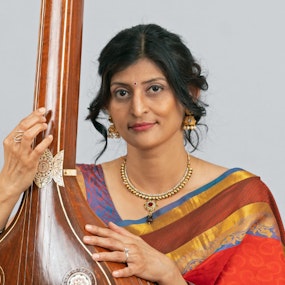
Seema Kasthuri
Musician/Vocalist/Composer/Artistic Director
Seema Kasthuri is a practitioner, performer and teacher of Carnatic classical from St. Louis MO. Seema is a student of Vidushi Nagamani Srinath, who started at a young age under Vid Ventakesh at her hometown Hassan. She is also extremely blessed to have learnt with Ustad Imrat Khan in St. Louis.
Seema is passionate about working with various Genre’ of music. Her new album “Wind-Chyme” yet to be launched is a creative combination of classical, fusion, Rap and R&B
Soorya School of Music is a teaching wing of Soorya Performing Arts in St. Louis run by Gurus Seema and Prasanna. Seema teacher music to aspiring students of all ages. Her students are motivated and have performed solo concerts and competitions
New to the Podcast? Start listening to some of these episodes!
You can check out episodes by topic or season at the top and bottom of the page.













